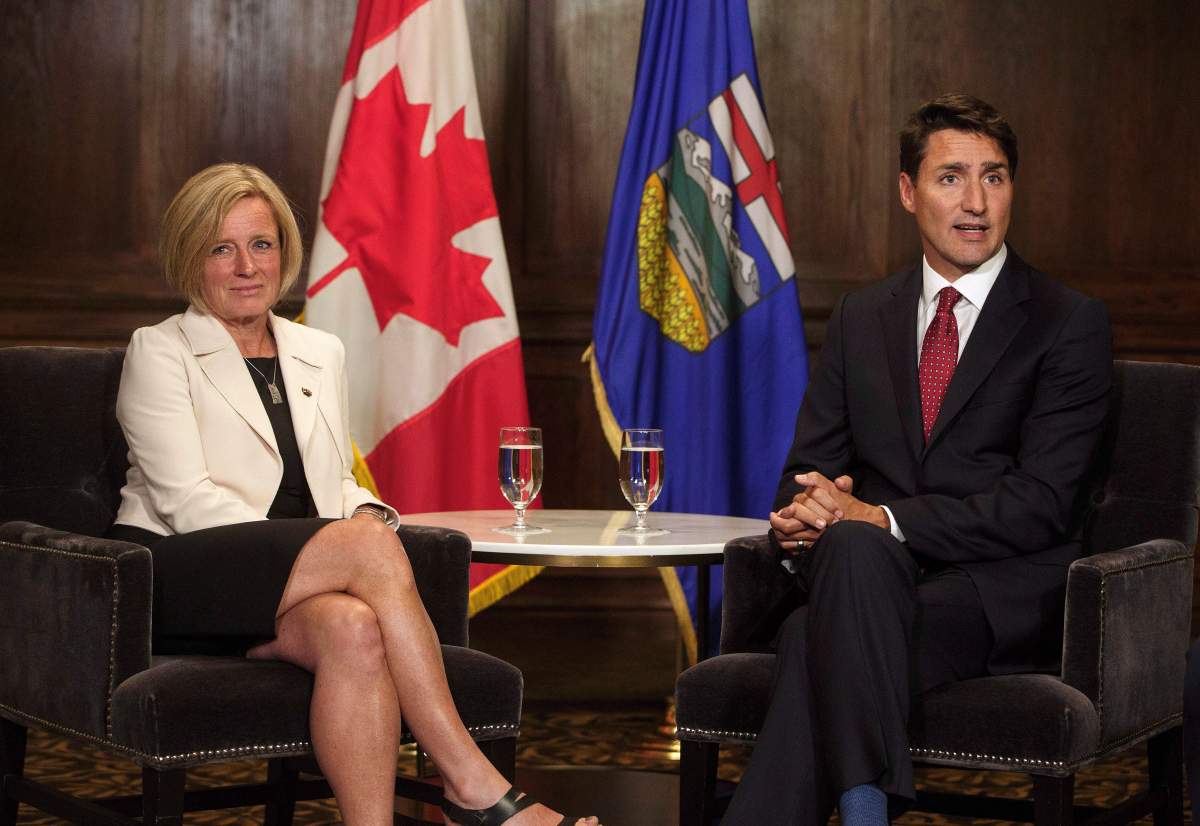Rerouting the Trans Mountain pipeline expansion to avoid a First Nation’s aquifer and ensuring another First Nation will always be immediately notified of a pipeline spill are among the steps Ottawa could take to address Indigenous concerns about the project.

The existing pipeline already runs between Edmonton and Burnaby, B.C., carrying various types of crude and refined oil products to be shipped on tankers through the Burrard Inlet to the Pacific Ocean. The expansion proposes to build a second pipeline roughly parallel to the first in order to triple the capacity.
READ MORE: Trans Mountain pipeline should go ahead even if consultation doesn’t end with consensus, Notley says
Last week, the Federal Court of Appeal quashed approval for the project citing insufficient consultation with Indigenous communities and a failure to assess the environmental impact of more tanker traffic off the coast of British Columbia.
Prime Minister Justin Trudeau has murmured about using that decision as a road map forward and it provides a number of clear suggestions for what needs to be done.
For example, the Coldwater Indian Band in the central interior of B.C. proposed an alternate route for the new pipeline that it felt posed less risk to its aquifer, its sole source of drinking water.
The Tsleil-Waututh First Nation, whose territory sits right on the Burrard Inlet, raised concerns about the impact of all that extra oil and the higher risk of spills when the number of oil tankers increases.
In consultations with both bands, the court said Canada listened and tried to understand the concerns but didn’t try to figure out what could be done to address them.
READ MORE: Suncor CEO says company won’t approve more oil production expansions without progress on pipelines

Get daily National news
With Tsleil-Waututh, the federal government’s response was a promise to come up with a plan “over the next few years” to address the increased risk from about five tankers a month to more than 30, travelling the inlet loaded with diluted bitumen.
The band never felt the government took its concerns seriously. One of its specific asks was to have the issue of increased oil tankers assessed under the Canadian Environmental Assessment Act, which was not done. Such an assessment could have also addressed the court’s criticism that the National Energy Board hadn’t properly assessed the risk of the increased tanker traffic.
READ MORE: Justin Trudeau says adhering to the court’s guidance best way to get Trans Mountain built
On Wednesday, Trudeau hinted that altering the route or introducing additional mitigating measures were things to be considered.
Alberta Premier Rachel Notley said Thursday she hasn’t given Ottawa a deadline for producing a plan but said both Alberta and Canadian officials are “brainstorming solutions.”
She said she felt Ottawa understood the urgency but is still hoping for a direct plan soon.
“A week has passed and we need clear answers,” she said.
WATCH: Alberta Premier Rachel Notley speaks to media on Thursday, after meeting with her Market Access Task Force and energy industry leaders.
NDP MP Richard Cannings said when the Liberals decided to do additional consultations with Indigenous communities in 2016, it was a chance not just to listen but to directly address concerns. It listened but didn’t do anything, despite being given many specific actions that could have made First Nations more comfortable with the project, he said.
The court found the government mistakenly believed it couldn’t add any additional conditions to the pipeline’s approval beyond the 157 conditions applied by the National Energy Board when it recommended approval in May 2016.
The Stó:lō Nation — a political amalgamation of 11 Stó:lō communities in B.C.’s Fraser Valley — did their own assessment and made 89 recommendations about how their concerns could be mitigated. Those recommendations included having Stó:lō input on fishing management plans, the location of water testing facilities and river bank restoration.
One was as simple as a declaration that Stó:lō representatives would be notified immediately if the pipeline leaks or spills any amount of bitumen.
“These measures are specific, brief and generally measured and reasonable,” the court ruling says.
But the National Energy Board did not adopt a single one of Stó:lō conditions, and neither did cabinet.
The Squamish Nation, which also holds territory on Burrard Inlet, felt it didn’t have enough information to know whether the project would have a negative impact on its land or people, and one of the biggest gaps in information was about how diluted bitumen behaves when spilled in ocean water.
Similar concerns were raised by the British Columbia government and are behind that province’s court challenge trying to prevent diluted bitumen from flowing through the pipeline until more is known about the substance.
The federal government’s response to that was largely to say there were existing regulations requiring Kinder Morgan to anticipate, prevent and mitigate risks to people, the environment or property.
WATCH: The fallout from a bombshell Federal Court of Appeal decision to quash Ottawa’s approval of the Trans Mountain Pipeline Expansion continues as dozens of B.C. workers now face a very uncertain future. Paul Johnson reports.
















Comments
Want to discuss? Please read our Commenting Policy first.